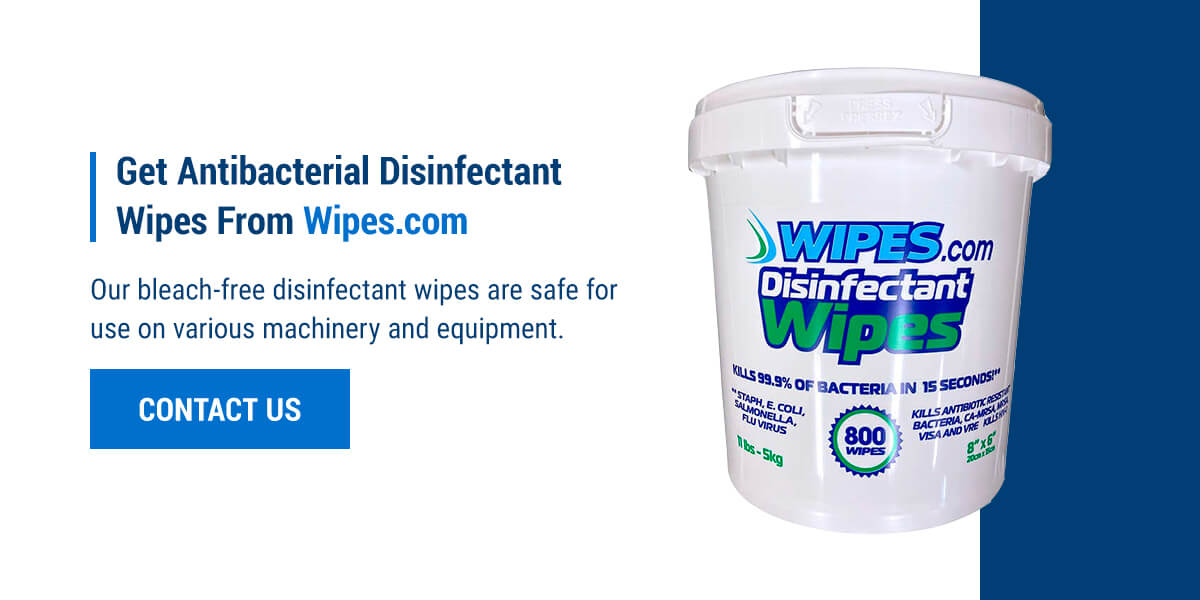How Safe Are Disinfecting Wipes?
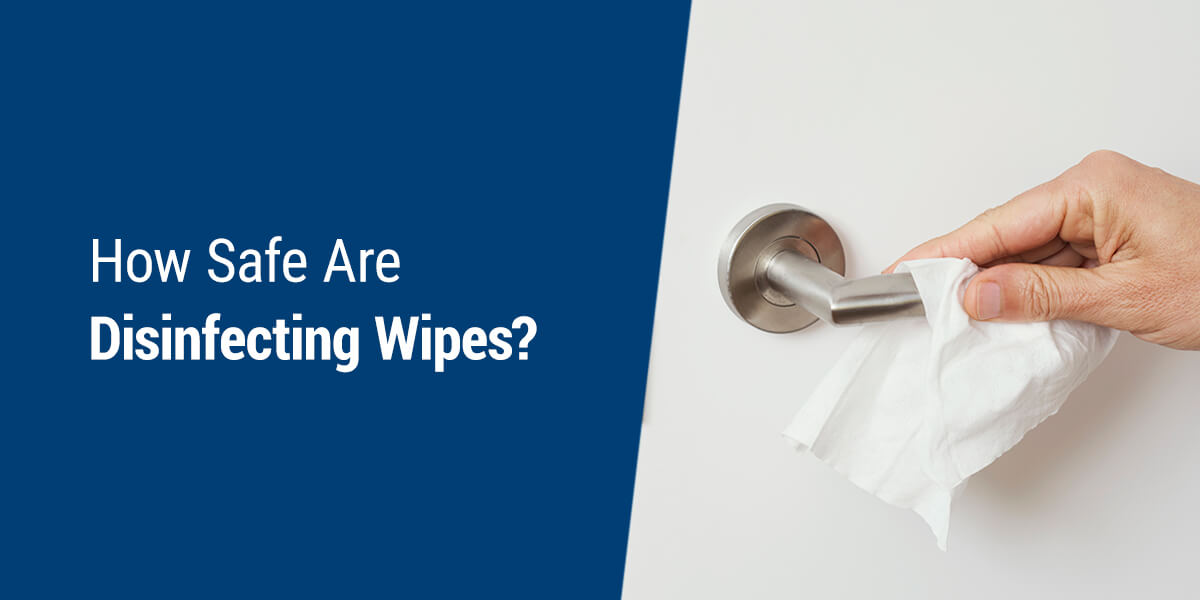
How Safe Are Disinfecting Wipes?
Regardless of the brand or where you buy them, disinfectant wipes will have a similar chemical makeup that allows them to effectively neutralize viruses. Disinfectant wipes' chemical composition helps make them effective at killing viruses and bacteria. Learn more about whether disinfecting wipes are safe for food surfaces and other applications.
Are Disinfecting Wipes Safe?
Many people may wonder if the chemical makeup of disinfectant wipes is safe to use for various surfaces or applications. The first step is to clarify and understand the difference between disinfectant wipes and sanitizing wipes. Many sanitizing wipes are safe for use on various surfaces, including the hands and skin. Sanitizing wipes can prevent the transmission of illnesses by reducing the number of bacteria on surfaces and spread from skin-to-skin contact.
Disinfectant wipes are often too harsh for sensitive or delicate surfaces. Generally, disinfectant wipes are for cleaning equipment or surfaces that do not require the sensitivity a sanitizing wipe provides. While sanitizing wipes are for lighter applications and skin use, disinfectant wipes are ideal for surfaces that require a thorough clean. Learn more about disinfectant wipes' safety and use.
1. Are Disinfectant Wipes Safe for Skin?
While sanitizing wipes are safe to use on your hands and skin, they are generally not recommended for use around your eyes, which are highly sensitive. Avoid direct contact with your eyes, and immediately rinse with water if your eyes come into contact with chemicals from a sanitizing wipe.
Always check the ingredient list on wipes before using them on your skin, and only use sanitizing wipes on healthy, unbroken skin. Harsh disinfectant wipes are never safe for use on your skin, as their chemicals are for heavier-duty applications.
2. Are Disinfectant Wipes Safe for Pets?
Disinfectant wipes are also not safe around dogs, cats or other pets, but some sanitizing wipes may be pet-safe. While you should not use a disinfectant wipe directly on your pet, these wipes can be ideal for cleaning some pet equipment. For example, a pet shop may use these for heavier-duty applications, such as wiping down kennels and cleaning play areas or dog baths. Additionally, disinfectant wipes are ideal for tidying up pet messes, such as spills or mud tracks.
If you are looking for a cleansing wipe for pets, you can use pet-safe sanitizing wipes, which use sensitive ingredients that will not irritate pets' skin or fur. As a general rule of thumb, if you would not use a wipe on yourself or your children, it is not a good choice for your pet, either.
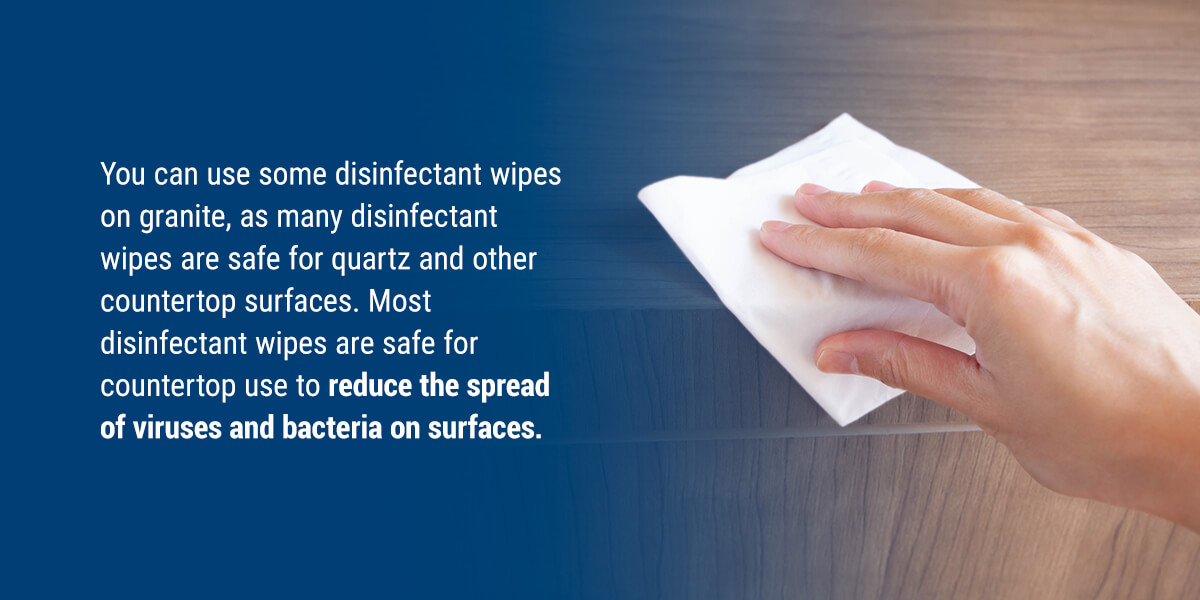
3. Are Disinfectant Wipes Safe for Granite and Other Surfaces?
You can use some disinfectant wipes on granite, as many disinfectant wipes are safe for quartz and other countertop surfaces. In general, you should avoid using harsh disinfectant wipes containing chemical-based solutions, such as bleach, orange, lemon or vinegar, as these may damage your countertops.
Fortunately, most disinfectant wipes are safe for countertop use to reduce the spread of viruses and bacteria on surfaces. Many small businesses, including coffee shops or kitchens, rely on disinfectant wipes to effectively sanitize a countertop or breakroom without leaving harsh chemical residues. In general, disinfectant wipes are safe for leather, but it is critical to distinguish between leather-safe disinfectant wipes and other wipes.
While disinfectant wipes are excellent at disinfecting surfaces, they often contain alcohol or other chemicals that remove the natural moisture and oil from genuine leather surfaces, causing leather to dry and potentially split or crack. Fortunately, you can replace lost moisture by applying a leather conditioner to the surface.
4. Are Disinfectant Wipes Safe for Electronics?
Disinfectant wipes are safe for laptops and other common electronics. Many offices or companies use disinfectant wipes to safely, effectively clean shared hardware and equipment to reduce the spread of illnesses. You can also use disinfectant wipes on televisions, phones and desktop computers.
While some people prefer to use special phone-safe wipes, many disinfectant wipes are safe for cellphones and phone screens. Here are the steps to safely disinfect electronic devices.
- Shut them down: The first step is to fully power down your devices and unplug them from the outlet or charger. Powering off equipment can prevent electronics from shorting out if any cleaning solution enters the device's internal mechanisms. Remove any protective casing and clean it separately.
- Use a microfiber cloth: Using a disinfectant wipe and microfiber cloth is an excellent way to control the amount of solution you place on your electronics. If using a spray bottle, don't apply it directly to your screen. Instead, spraying the solution onto a microfiber cloth helps prevent dripping or liquids from getting inside the device.
- Be gentle: When using disinfectant wipes and cleaning solutions with electronics, it is still crucial to be gentle and careful. Avoid being overzealous or applying too much pressure, especially on sensitive equipment or screens.
- Allow the device to dry: Even though you were careful not to drench your electronic equipment in solution, you will still need to give it plenty of time to dry before turning the power back on.
5. Are Disinfectant Wipes Safe for Baby Toys?
Kid-safe disinfecting wipes are an excellent way to clean baby and kid toys. Disinfectant wipes help ensure your children's toys and play equipment are safe and sanitized to prevent bacterial spread. Though disinfectant wipes are ideal for children's toys and plastic furniture, never use them directly on a baby or child. Always rise with soap and water any area you use a disinfectnig wipe on.
Instead, you will want to select a kid-safe sanitizing wipe to clean a baby's hands. Disinfectant wipes contain harsh chemicals that are not safe for babies' skin and can easily irritate or harm a child. You should only apply baby-safe sanitizing wipes for direct skin contact for babies or children.
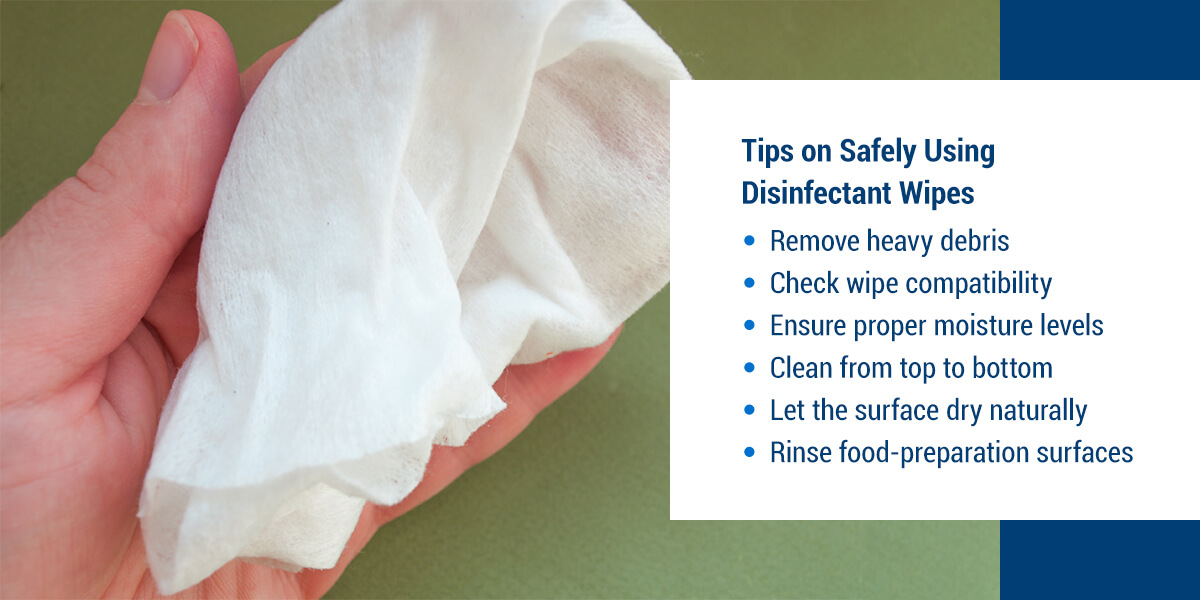
Tips on Safely Using Disinfectant Wipes
While disinfectant wipes are user-friendly cleaning products, review these specific tips to use them safely and effectively.
- Remove heavy debris: While disinfectant wipes are an essential cleaning tool, they might not hold up well to a thick layer of grease, grime, crumbs or other debris. Instead, you should wipe down a surface to remove most of the mess before cleaning the surface with a disinfectant wipe.
- Check wipe compatibility: Not all wipes are ideal for every surface. For example, some disinfectant wipes may be multipurpose, but that does not mean you can use them to clean everything in your home or business. Read the label to understand where and how you can safely use these products.
- Ensure proper moisture levels: A dry disinfectant wipe cannot properly cleanse and sanitize a surface. If the container is old or closed incorrectly, the wipes will probably dry out, making them ineffective. If wipes are dry to the touch, it's time to get a new container.
- Clean from top to bottom: If you begin cleaning the bottom of a counter and work your way up, you are likely to notice dust, grime and debris following down, soiling your cabinets' lower parts. Cleaning from top to bottom can prevent this from happening and ensure your cabinet and surfaces remain clean.
- Let the surface dry naturally: For the best results, you should let a disinfected surface dry naturally, neutralizing the microbes as it does so.
- Rinse food-preparation surfaces: If you use a disinfectant on a food-prep surface, rinse with clean water and dry it with a towel.
Things to Know About Disinfectant Wipes
While you may hear the terms "sanitizing," "disinfecting" and "cleaning" used interchangeably, these words are not synonymous. Cleaning physically removes dirt and debris from a surface, while sanitizing means killing bacteria on a cleaned surface. Finally, disinfecting aims to kill and neutralize a wider range of bacteria than sanitizing.
Another thing to know about disinfectants is that some may destroy paper or delicate materials, making them ineffective on textiles or other fragile items. Always read the product label before using it to ensure it suits your intended purpose.
Things to Consider With Disinfectant Wipes
When using disinfectant wipes, consider the following factors.
- Intended use: How do you plan to use this product, and what do you need to disinfect? Some disinfectant wipes are exclusively for specific materials, such as leather, plastic or even granite. Carefully read the product's label, and only use it for the stated purpose.
- Personal protective equipment: Some disinfectants may require the user to wear PPE. While many people may hear this term and picture a full industrial-strength hazmat suit, PPE can be as simple as wearing gloves and goggles to prevent harsh chemicals from irritating your skin and eyes. Additionally, some people may prefer to wear a simple cloth mask to minimize the chemicals they breathe in when disinfecting surfaces.
- Proper disposal: After using a disinfectant wipe, you will want to dispose of it correctly. To prevent sewage clogs, never flush disinfectant wipes down the toilet. Instead, throw them in the trash.
Potential Dangers of Misusing Disinfectant Wipes
Disinfectant wipes are a safe and effective way to clean surfaces and reduce the spread of bacteria and viruses. Unfortunately, misusing disinfectant wipes can lead to potential complications or health concerns. For example, touching your eye after using a disinfectant wipe may cause painful irritation and blurred vision. If this occurs, immediately rinse your eye with water to get the solution out of your eyes.
Safe storage is another essential consideration when using disinfectant wipes. A good example to consider is a day care or school. If a custodian doesn't keep these products in a secure area, a child may accidentally play with or ingest chemicals, with harmful results.
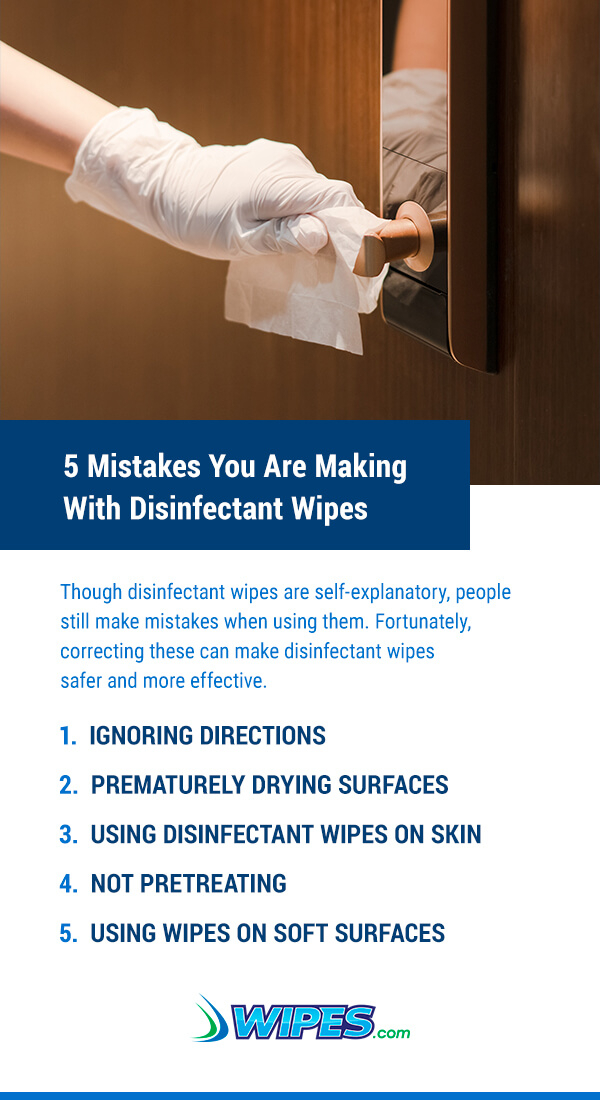
5 Mistakes You Are Making With Disinfectant Wipes
Though disinfectant wipes are self-explanatory, people still make mistakes when using them. Fortunately, correcting these can make disinfectant wipes safer and more effective.
1. Ignoring Directions
One typical mistake disinfectant wipe users make is ignoring directions or failing to read the label. Some wipes may not effectively kill all types of viruses or bacteria, so be mindful of that.
2. Prematurely Drying Surfaces
After wiping down a surface with a disinfectant wipe, it should remain visibly wet for a little while. Drying it with a paper towel can reduce the disinfectant's effectiveness. In some cases, a disinfectant can neutralize bacteria in as little as a few seconds. In other cases, your product may need a few minutes to work.
3. Using Disinfectant Wipes on Skin
Most disinfectant wipes are too harsh to use directly on your skin, and can cause irritation, dryness or an allergic reaction. If you are looking to sanitize your hands without soap and water, use a sanitizing wipe instead.
4. Not Pretreating
While wipes are an essential part of a healthy cleaning routine, they aren't the only product you should use, especially if the surface you're trying to clean is filthy with grease and grime. If you have a lot of dirt and debris to tidy up, you may want to pretreat the surface. After that, you can use a disinfectant wipe to neutralize germs.
5. Using Wipes on Soft Surfaces
Most disinfectant wipes are not ideal for soft fabrics, such as couches, carpets or paper. Why? These surfaces tend to absorb the wipe's moisture, making it ineffective. In general, disinfectant wipes are ideal for nonporous surfaces.
Antibacterial Disinfectant Wipes
Wipes.com is a leading provider of premium disinfectant wipes that can kill bacteria and prevent the spread of viruses. Our bleach-free disinfectant wipes are safe for use on various machinery and equipment. Disinfectant wipes from Wipes.com also have a one-year storage lifespan and refillable dispensers for ease. If you need a larger quantity, we offer competitive pricing for disinfectant wipes bulk orders.
Browse our products or contact us online today to start your custom order of disinfectant or sanitizing wipes.
Recent Posts
-
Understanding Antibiotic-Resistant Bacteria: MRSA & CA-MRSA
Section 1: Everyday Understanding of MRSA & CA-MRSA What Are Antibiotic-Resistant Bacteria? Anti …3rd Jun 2025 -
Sweaty Gear, Clean Gains: Why Summer Hygiene Is Critical for Sports Facilities
When temperatures rise, so does the grind — and the grime. Summer is peak season for workouts, …27th May 2025 -
The Clean Pool Club: Why Facility Hygiene Sells More Summer Memberships
Summer is prime time for pool facilities to shine — both literally and financially. As tempera …21st May 2025

